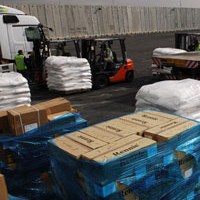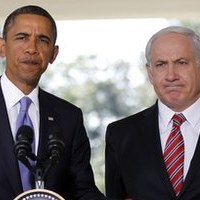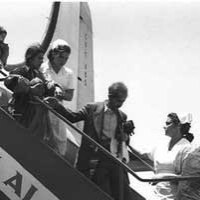December 15, 2009
Communicated by the Israeli Deputy Foreign Minister’s bureau
Today, 15th December, Asharq Al-Awsat, one of the largest pan-Arab daily newspapers printed an op-ed in Arabic by the Deputy Foreign Minister of the State of Israel, Danny Ayalon. The op-ed was titled “An Open Letter to the Arab World”.
In an historic and unprecedented article, Ayalon calls on the Arab world to accept Israel’s extended hand in peace and fraternity. The Deputy Foreign Minister calls on the Arab world to step forward and join with Israel to defeat the forces of extremism and destruction in the Middle East. Iran and its terrorist followers on the one hand and climate change on the other are issues which threaten Arabs and Israelis alike. It is surely time to look to the future and break with former intransigencies to create a better future for all the people of the region.
For us to be able to face these and many other challenges, Ayalon states that we need to break with the paradigms of the past. “The Jewish people are here because of our historical, legal, moral and national rights,” Ayalon states. “Israel has gone very far and is prepared to do its part, but we must be met by a willing partner. Without this, the region is doomed to more conflict and will negate the unity of purpose in the Middle East that is necessary to face the mounting challenges from without and within.”
—
An Open Letter to the Arab World
English translation:
by Danny Ayalon (Israel Deputy Minister of Foreign Affairs)
Since the reestablishment of our state, Israeli leaders have sought peace with their Arab neighbors. Our Declaration of Independence, Israel’s founding document that expressed our hopes and dreams reads, “We extend our hand to all neighboring states and their peoples in an offer of peace and good neighborliness, and appeal to them to establish bonds of cooperation and mutual help.” These words are as true today as when they were first written in 1948. Sadly, 61 years later, only two nations, Jordan and Egypt, have accepted these principles and made peace with the Jewish State.
Recently the Israeli government has made significant steps to restart negotiations with the Palestinians and reach out to the Arab world. In his Bar-Ilan speech in June, Prime Minister Netanyahu clearly stated his acceptance of a Palestinians state living side by side in peace and security with the State of Israel. My government has removed hundreds of roadblocks to improve access and movement for Palestinians and has assisted the facilitation of economic developments in the West Bank, through close cooperation with international parties to expedite projects and remove bottlenecks.
Finally, and perhaps most importantly, a right-wing government has, in an unprecedented move, declared it would refrain from building new settlements in the West Bank. All of these moves taken together amply demonstrate Israel’s willingness for peace.
This Israeli government is also committed to extend a hand to all of our Arab neighbors, its leaders and its citizens, to join together to face some of the major challenges facing us all in the coming years.
For the first time in many years, we find ourselves on the same side in seeking to quell and defeat the forces of extremism and destruction in our region. While many see the threat from Iran directed solely at Israel, we in the region know differently. Together, we understand the menace that emanates from the extremist regime in Tehran. A regime that seeks to export its extremist ideology across the region and beyond, while arming terrorist groups that seek to destabilize moderate Sunni regimes and aiming for hegemonic control of the Middle East and far beyond.
The Iranian regime has many tentacles spread out across the region sowing destruction and despair amongst the people. The enemy of the people of Lebanon is not Israel, but Hizbullah. The enemy of the Palestinian people is not Israel, but Hamas. The enemy of the Egyptian people is not Israel, but militant Islamist opposition groups. All of these groups, and many others, receive their commands from Iran, who wish to control and suppress any aspirations the region has towards freedom and advancement.
Iran seeks to hold an entire region, including its own people, to ransom and keep it engaged in conflicts orchestrated and directed from Tehran. Whether it is in Morocco, Iraq or Yemen, Iran is constantly interfering with Arab sovereignty for their own nefarious gain. Israel and its Sunni neighbors alike are in the sights of Khameini, Ahmadinejad and their minions.
If Iran is able to attain nuclear weapons, the situation becomes inexplicably and inexorably worse. The Iranian regime has demonstrated that if feels unrestricted in its ability to dominate our region, a nuclear umbrella will only embolden its acolytes to act unrestrained to the detriment of us all. Only together can we face this threat and remove it.
Another issue that entails mutual political will to overcome is the threat of climate change to our region. Many reports and organizations are pinpointing the Middle East as an area that will suffer gravely as rain falls even more infrequently and temperatures rise.
Recently, the leading international scholars on climate change met in Copenhagen and released an important report on this issue. They claimed that climate change will exacerbate conflicts and increase strains and violence among competing groups. We are already witnessing water rights and growing desertification as underlying reasons for the intensification of conflicts in our region.
Making the desert bloom
has been a core component of the Zionist ethos and successes throughout the decades. Israel has been able to turn desert into arable land and barren landscapes into forests. We constantly share our agricultural miracles with our friends in Africa and Asia and it is for this reason that many countries of the developing world have sought partnership with Israel in addressing their own agricultural challenges.
However, as Israel’s founding fathers wrote in 1948, Israel is prepared to do its share in a common effort for the advancement of the entire Middle East. Our partners in peace, Jordan and Egypt, and especially the Palestinian Authority, bear witness to our endeavors in this direction. Israel has actively cooperated with Egypt on the “Mubarak Project” for the establishment of an irrigation demonstration system in Nubariya and annually trains hundreds of Jordanians in Israel in fields such as sustainable eco-friendly agricultural methods.
For us to be able to face these and many other challenges, we need to break with the paradigms of the past. The Jewish people are here because of our historical, legal, moral and national rights.
Those naysayers who can not countenance a Jewish political presence in the region will doom all of us to many more decades of conflict and instability. It is time for courageous leaders to emanate from the Arab world as did Egyptian President Anwar Sadat in 1979 and Jordan’s King Hussein in 1994 and recognize that peaceful coexistence is far better for all of our people than enduring conflict and enmity.
We recognize that the Arab Peace Initiative is an important document, and is welcomed in Israel as a crack in the denial of an Arab recognition of Israel. However, like the Palestinian Authority’s dictates to Israel on the peace process, it remains frozen in 1993.
Since the historic handshake between Israeli Prime Minister Yitzhak Rabin and PLO Chairman Yasser Arafat on the White House lawn, Israel has taken major strides both politically and strategically towards the Palestinian position.
Both in 2000 at Camp David and in 2008 during the Annapolis process, Israeli prime ministers offered the Palestinians everything possible for peace and on both occasions the Palestinian leadership rejected these offers. The Palestinian Authority, like the Arab Peace Initiative, is still holding to its maximalist positions and has not moved an inch towards Israel since 1993. These positions are obviously untenable for peace and reflect a worldview that ignores Israel’s significant gestures and seeks to enforce a solution that will mean the end of the Jewish State. Recent Palestinian and Arab League declarations only enforce this view.
It is surely time to look to the future and break with former intransigencies to create a better future for all the people of the region. Israel has gone very far and is prepared to do its part, but we must be met by a willing partner. Without this, the region is doomed to more conflict and will negate the unity of purpose in the Middle East that is necessary to face the mounting challenges from without and within.
Mazzeltov,
Crethi Plethi



 RSS
RSS











Danny Ayalon – "Open Letter to the Arab World" http://bit.ly/8Ys8Pk #Israel
Danny Ayalon – "Open Letter to the Arab World" http://bit.ly/8Ys8Pk #Israel
RT @CrethiPlethi: Danny Ayalon – "Open Letter to the Arab World" http://bit.ly/8Ys8Pk #Israel
RT @CrethiPlethi: Danny Ayalon – "Open Letter to the Arab World" http://bit.ly/8Ys8Pk #Israel
[…] This post was Twitted by TamaHinckley […]